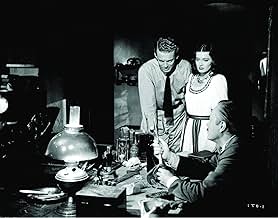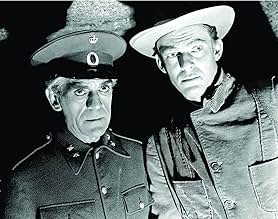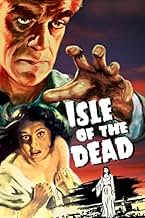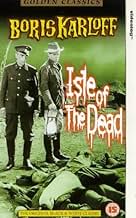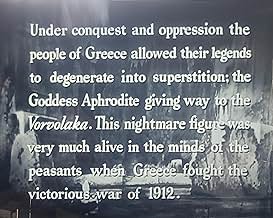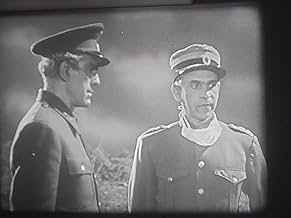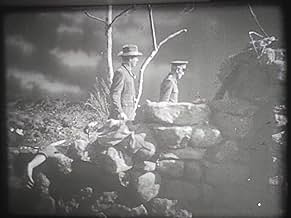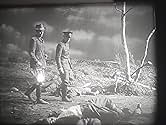NOTE IMDb
6,5/10
5,6 k
MA NOTE
Ajouter une intrigue dans votre langueA Greek general takes leave from the 1912 Balkan War to visit a small island in Greece, where his wife is buried. A plague soon breaks out and he is forced to stay when quarantine is declare... Tout lireA Greek general takes leave from the 1912 Balkan War to visit a small island in Greece, where his wife is buried. A plague soon breaks out and he is forced to stay when quarantine is declared.A Greek general takes leave from the 1912 Balkan War to visit a small island in Greece, where his wife is buried. A plague soon breaks out and he is forced to stay when quarantine is declared.
- Réalisation
- Scénario
- Casting principal
- Récompenses
- 2 nominations au total
Jason Robards Sr.
- Albrecht
- (as Jason Robards)
Ernst Deutsch
- Dr. Drossos
- (as Ernst Dorian)
Sherry Hall
- Col. Kobestes
- (non crédité)
Erick Hanson
- Officer
- (non crédité)
Rose Hobart
- Mrs. Mary St. Aubyn (in long shot)
- (non crédité)
Skelton Knaggs
- Andrew Robbins
- (non crédité)
Avis à la une
Plague victims are dropping like flies in this somewhat sluggish, Mark Robson-directed entry in the Val Lewton horror cycle. This one isn't as well-written as the earlier films in the series, and the isolation, while nicely suggested psychologically, fails to cast the spell of hopelessness and despair it ought to. The movie is too genteel to be frightening, and lacks the fine tuning of a director like Jacques Tourneur, who surely would have made more of it. Boris Karloff is quite good in the "lead", however, and the supporting cast is competent if unexciting. By today's standards, there's not much to be scared of here, and though it works up a nice head of steam near the end, it succeeds more as a mood piece than a horror tale.
... probably not even for 1945.
Gen. Nikolas Pherides (Boris Karloff) has just successfully beat back invading troops in 1912 Greece. He is conversing with American war correspondent Oliver Davis about his philosophy of war, when Davis says he is going over to the small island near the battlefield to look around. The general mentions his wife is buried there and says that he will go over with him to visit her grave. When they get there they find the grave has been robbed.
They come across the home of retired Swiss archeologist Dr. Aubrecht (Jason Robards, Sr.), his Greek housekeeper Madame Kyra, British diplomat Mr. St. Aubyn (Alan Napier) and his pale and sickly wife, her youthful Greek companion Thea, and English tinsmith Andrew Robbins. Aubrecht explains that the graves were robbed by locals years ago, searching for antiquities. The general and Davis spend the night there, but the next morning the tinsmith is found dead of the plague. This means they must all stay on the island until the winds change and the disease - always fatal -runs its course among them.
What follows is a psychological thriller that gets a bit too chatty and claustrophobic for my taste, but it has its good points. The main focus is the general, and how his desire to protect through strict control, which works well in the aggregate when he is commanding troops, turns malignant and to madness when his normally logical mind is peppered with thoughts of a vorvolaka - a type of vampire - by the superstitious and rather malicious servant Madame Kyra. Kyra insinuates Thea is the vorvolaka and that she's the reason that Mrs. St. Aubyn's health is slowly fading. The general's imagination does the rest.
Gen. Nikolas Pherides (Boris Karloff) has just successfully beat back invading troops in 1912 Greece. He is conversing with American war correspondent Oliver Davis about his philosophy of war, when Davis says he is going over to the small island near the battlefield to look around. The general mentions his wife is buried there and says that he will go over with him to visit her grave. When they get there they find the grave has been robbed.
They come across the home of retired Swiss archeologist Dr. Aubrecht (Jason Robards, Sr.), his Greek housekeeper Madame Kyra, British diplomat Mr. St. Aubyn (Alan Napier) and his pale and sickly wife, her youthful Greek companion Thea, and English tinsmith Andrew Robbins. Aubrecht explains that the graves were robbed by locals years ago, searching for antiquities. The general and Davis spend the night there, but the next morning the tinsmith is found dead of the plague. This means they must all stay on the island until the winds change and the disease - always fatal -runs its course among them.
What follows is a psychological thriller that gets a bit too chatty and claustrophobic for my taste, but it has its good points. The main focus is the general, and how his desire to protect through strict control, which works well in the aggregate when he is commanding troops, turns malignant and to madness when his normally logical mind is peppered with thoughts of a vorvolaka - a type of vampire - by the superstitious and rather malicious servant Madame Kyra. Kyra insinuates Thea is the vorvolaka and that she's the reason that Mrs. St. Aubyn's health is slowly fading. The general's imagination does the rest.
I'm still not quite sure what I saw in Isle of the Dead. I do know it succeeded in giving me the willies.
Several people gather on Greek Island during the Balkan Wars when a type of plague strikes and folks die one by one. One old peasant woman, Helene Thimig suspects young and pretty Ellen Drew of being a monster called a Vorvola which was part of the old Greek religion of Zeus and the rest of the folks from Olympus. The problem is that she gets old Greek general Boris Karloff, a brooding and suspicious man to start with, believing it as well.
Imagine Agatha Christie's And Then There Were None laced with the atmosphere of a horror film and you've got Isle of the Dead. At the end of the film you're not even sure what's happened, but the mood created in you by producer Val Lewton will linger on.
I'm not sure what a guy like Val Lewton would have done with a big budget in a studio like MGM or Paramount. Those recycled RKO sets with the proper sinister lighting were a signature with him.
So was there a Vorvola? Watch and judge for yourself.
Several people gather on Greek Island during the Balkan Wars when a type of plague strikes and folks die one by one. One old peasant woman, Helene Thimig suspects young and pretty Ellen Drew of being a monster called a Vorvola which was part of the old Greek religion of Zeus and the rest of the folks from Olympus. The problem is that she gets old Greek general Boris Karloff, a brooding and suspicious man to start with, believing it as well.
Imagine Agatha Christie's And Then There Were None laced with the atmosphere of a horror film and you've got Isle of the Dead. At the end of the film you're not even sure what's happened, but the mood created in you by producer Val Lewton will linger on.
I'm not sure what a guy like Val Lewton would have done with a big budget in a studio like MGM or Paramount. Those recycled RKO sets with the proper sinister lighting were a signature with him.
So was there a Vorvola? Watch and judge for yourself.
BORIS KARLOFF is a Greek general whose wife's body has mysteriously vanished from its tomb at the start of ISLE OF THE DEAD. He's naturally suspicious that something more evil than the plague has crept over the island he decides must be quarantined--forbidding anyone from leaving it. ELLEN DREW is a young woman he suspects may have something to do with evil spirits--or even vampirism--and MARC CRAMER is a young soldier who wants to protect her.
All the ingredients for a good chiller are here, but it's a story that gets its main strength, not from the plot, but from the sinister, shadowy B&W photography that sets up the moody atmosphere from the start, with an air of dread lingering over every scene.
Aiding considerably are strong performances from KATHERINE EMERY as a sick woman who fears being buried alive, and HELEN THIMIG as a superstitious old woman. In fact, all of the supporting players do well under Mark Robson's taut direction.
The tale itself is not one of my favorites but it's a credit to all concerned that they do a job of giving it a creepiness that should satisfy even the most jaded of Gothic horror fans.
And yet, ultimately, there's a bit of a letdown as far as the story itself is concerned. The ingredients are all there, but something vital is missing and I'm sorry to say I don't know exactly what it is.
Nevertheless, holds the interest throughout.
All the ingredients for a good chiller are here, but it's a story that gets its main strength, not from the plot, but from the sinister, shadowy B&W photography that sets up the moody atmosphere from the start, with an air of dread lingering over every scene.
Aiding considerably are strong performances from KATHERINE EMERY as a sick woman who fears being buried alive, and HELEN THIMIG as a superstitious old woman. In fact, all of the supporting players do well under Mark Robson's taut direction.
The tale itself is not one of my favorites but it's a credit to all concerned that they do a job of giving it a creepiness that should satisfy even the most jaded of Gothic horror fans.
And yet, ultimately, there's a bit of a letdown as far as the story itself is concerned. The ingredients are all there, but something vital is missing and I'm sorry to say I don't know exactly what it is.
Nevertheless, holds the interest throughout.
Wonderfully atmospheric film with a unique sense of place and well-drawn characters. Karloff's performance here is excellent, yet very different from his work in other films. You may be disappointed if you go in expecting something like his horror classics for Universal. This one is suggestive rather than shocking, and I'd recommend it to anyone who likes the subtle horrors of Cat People, The Innocents, or even Rosemary's Baby. Because of its literate script and interesting character development, Isle of the Dead may also appeal to others who don't usually like horror.
Le saviez-vous
- AnecdotesRose Hobart was cast in the film, but Boris Karloff became ill and the production had to be shut down until he recovered. By the time he returned, she was working on another film and was replaced. However, Hobart said in a 1984 interview that she can still recognize herself in long shots.
- GaffesAlbrecht refers to Hermes as the god of medicine. In Greek mythology, Asclepius was the god of medicine. In terms of medical support, Hermes' assistance was sought by runners or any athletes with injuries.
- Crédits fousIntro: "Under conquest and oppression the people of Greece allowed their legends to degenerate into superstition; the Goddess Aphrodite giving way to the Vorvolaka. This nightmare figure was very much alive in the minds of the peasants when Greece fought the victorious war of 1912."
Meilleurs choix
Connectez-vous pour évaluer et suivre la liste de favoris afin de recevoir des recommandations personnalisées
Détails
- Date de sortie
- Pays d’origine
- Langue
- Aussi connu sous le nom de
- La isla de los muertos
- Lieux de tournage
- Société de production
- Voir plus de crédits d'entreprise sur IMDbPro
Box-office
- Budget
- 246 000 $US (estimé)
- Durée1 heure 11 minutes
- Couleur
- Rapport de forme
- 1.37 : 1
Contribuer à cette page
Suggérer une modification ou ajouter du contenu manquant

Lacune principale
By what name was L'île des morts (1945) officially released in India in English?
Répondre

